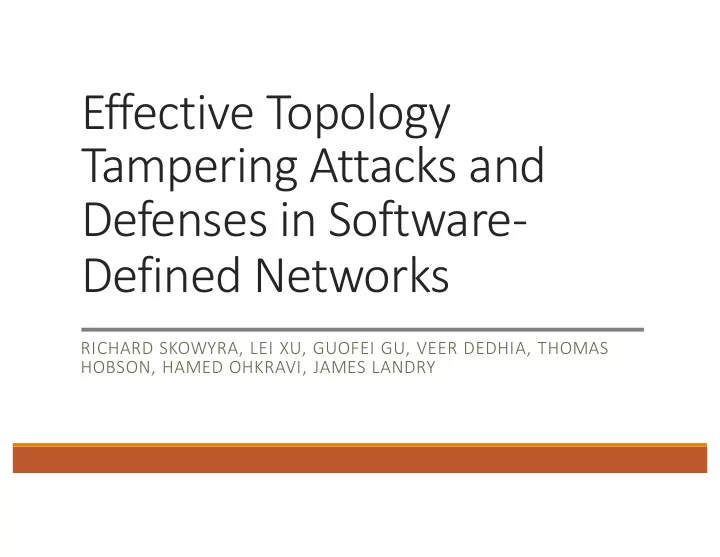

Effective Topology Tampering Attacks and Defenses in Software- Defined Networks RICHARD SKOWYRA, LEI XU, GUOFEI GU, VEER DEDHIA, THOMAS HOBSON, HAMED OHKRAVI, JAMES LANDRY
Software Defined Networks Allows controller to modify network configuration Control Plane: define network topology, network policies Data Plane: decisions that are local to a single switch Controller installs flow tables in switches defines how packets are forwarded
Topology Tampering Diverge controller’s view of topology from actual physical topology Introduce new hosts to network topology Introduce new links to network topology Delete hosts/links
Link Layer Discovery Protocol (LLDP) Contains port ID, system name, and system information Relays information about changing topology, switches added and removed, etc How the SDN controller gets it’s view of the topology
LLDP
Threat Model 1 or more compromised hosts on network In certain cases, can perform out of band communication with each other
Link Fabrication Forge or intercept LLDP packet, send to another switch Attacker attacks as a virtual link Allows for interception of traffic
Topoguard vs. Link Fabrication Controller signs LLDP packets Classify as switch vs host by checking for host generated traffic Raise alarm when LLDP packet from HOST
Initial Link Fabrication thoughts?
Port Amnesia Topoguard relies on per port behavioral profiler Topology of software defined network changes How can we exploit this?
Port Amnesia Topoguard relies on per port behavioral profiler Topology of software defined network changes Turn it off and on again
Topoguard+ vs. Port amnesia Control Message Monitor – During LLDP probe, raise alert if port-up or port-down Link Latency Inspector – out of band link fabrication Inspect link latencies, if too high, raise alert Add encrypted timestamps to LLDP
Link Latency Inspector
Thoughts? Does Control Message Monitor make sense? Just defeating their own defenses?
Host Tracking Service Maintained by SDN controller Maps IP/MAC to switch port that host is connected to
Host Location Hijacking Trick HTS into thinking migration from victim location to attacker location has occurred Spoof victim addressing information Controller installs flow rules that redirect victim’s traffic to travel to the attacker
Topoguard vs Host Location Hijacking Host Location Hijacking – migration verification Check port-down message received from previous location, Check old location unreachable after migration
Thoughts? What happens before migration is complete?
Port Probing Switches vulnerable between sending port-down and sending LLDP from their new location Must wait for legitimate movement, or force your own Goal is to efficiently check when another switch is offline
Port Probing Observe a vm by pinging it, waiting for migration
Port Probing Mechanisms ICMP – probably blocked by firewall TCP SYN scan – can be detected by 0 data flow Arp ping – slow but stealthy TCP idle scan – exploits side channel for stealthy scans, lots of preconditions
Port Probing Mechanisms ICMP – probably blocked by firewall TCP SYN scan – can be detected by 0 data flow Arp ping – slow but stealthy TCP idle scan – exploits side channel for stealthy scans, lots of preconditions
Thoughts on port probing? Does botched host location hijacking show malicious intent? Is it reasonable to force vm migration?
Topoguard+ vs Port Probing Port Probing – first end host to claim to be target will be treated as such Bind MAC address to user credentials Public Key Infrastructure
Evaluation
Security Evaluation Set up testbed in mininet Every instance of port amnesia was found
Performance Evaluation Function Overhead LLDP Construction .134ms LLDP Processing .299 ms
Thoughts one evaluation? Takes topoguard one minute to detect, how much damage can you do in that time?
Final Discussion & Questions
Recommend
More recommend